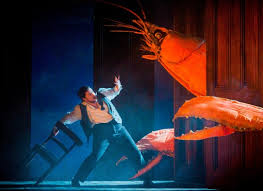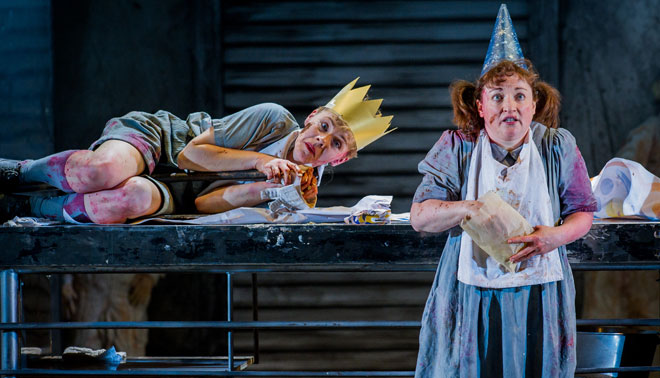Birmingham Hippodrome, 6-7 March 2015
The mid-season productions may both be revivals but there was little sense of cost-cutting where the musical presentation was concerned. As with previous seasons, operas have been grouped around themes and this one is concerned with magic, though there were some far more serious overtones.
Dominic Cooke’s production of The Magic Flute draws on the surreal for all of the action which has the great benefit of helping us ignore the many incongruities and problems of the libretto. Where other directors tie themselves in knots to make the work relevant, here we are required simply to enjoy – and the audience certainly did. A packed house for a Friday night, with significant numbers of younger people, followed the English text with ease and responded with relish. Much of the credit must go to Musical Director Lothar Koenigs whose approach was brisk and extrovert throughout. There was little sense of high spiritual values here, more of people finding ways to deal with the inevitable rough and tumble of life. Benjamin Hulett’s honest, open Tamino has the clear top for the range without ever seeming too precious. His Pamina, Anita Watson, was affective in Ach, ich fuhl’s and strong minded when dealing with Monostatos. Jacques Imbrailo’s Papageno has a strong South African accent, which normally would not notice but in the longer spoken sections clashed rather with the cut glass English around him. His singing however could not be faulted and the final duet with Papagena was a delight. As the Queen of the Night, Samantha Hay took a little time to settle but Die Holle Rache was cleanly and precisely projected. Scott Wilde certainly looked the part as Sarastro but the wobble in his voice was distracting when all around was so cleanly sung. Small parts were cast from strength and the small chorus projected easily within the single setting.
The following night brought a revival of Richard Jones’ Hansel and Gretel. Also sung in English, this is a dark account of the fairy tale, closer to the original Grimm than to a child’s story book. The sets are grey and claustrophobic throughout, the forest being a nightmare version of the children’s house and a precursor of the witch’s. The action is often uncomfortably naturalistic, and with missing children, child abuse and food-banks being such current issues the whole took on a far more sinister edge. The children dream of food at the end of Act One and the chef-angels bring a banquet for them. They stuff themselves when encouraged to do so in the witch’s kitchen from simple hunger.
Richard Jones highlights the Wagnerian overtones which are deep within the score. The children in the forest seem to reflect Siegmund and Sieglinde in Act Two of Die Walkure, and Adrian Thompson’s terrifying witch has much of Mime about it. This is also true of Lothar Koenigs conducting which reflects his approach to Die Meistersinger in its complexity and yet lightness of touch.
Singing is on a high level throughout with a magnificent mother from Miriam Murphy (when will we hear her as Brunnhilde?) and Ashley Holland convincingly warm as her husband. Ailish Tynan brings childlike glee to Gretel, combining comic flair with lyrical outbursts. She is never embarrassing and a convincing younger foil to her brother, a more ambivalent Jurgita Adamonyte who is never sure just how brave he actually wants to be. The final scene manages to use all the tricks of the kitchen scene from a pantomime yet keep the tension throughout, as we are only too aware of the lethal intentions of Adrian Thompson’s witch. He is a fine singer and actor but I doubt if he has ever done anything as convincing as this before. It was hilarious and terrifying at the same time.
Chorus – a chance for the fine WNO Chorus to show off their talents – will be reviewed in two weeks’ time when they are in Southampton.


